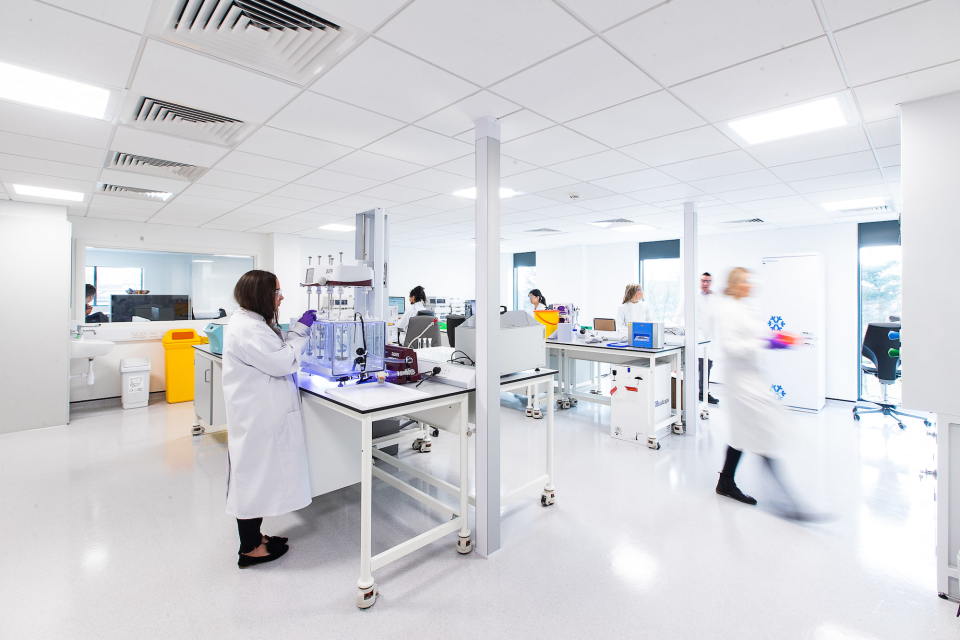How the science and tech sector will benefit from the pension investment rule changes
By Bruntwood SciTech

Last October, the Financial Conduct Authority (FCA) announced new rules and guidance designed to limit the barriers associated with long-term investment in illiquid assets. Paired with the potential relaxing of fee limits which is being considered by the government, this could mean an increased £3.19bn of investment into the UK’s science and technology sector by 2025.
In this article, we’ll be sharing more information on the updated policy, its influence on the investment landscape and how we expect it to positively impact the science and tech sector.
What are Long-Term Asset Funds?
The recent policy change has created a new category of authorised open-ended fund, named Long-Term Asset Funds (LTAF); making it easier for investors to invest in long-term, illiquid assets including venture capital (VC), private equity (PE), real estate and infrastructure.
How will the launch of LTAFs impact the investment landscape?
The main objective of the LTAFs is to encourage UK pension funds to direct more of their half a trillion pounds of capital towards the country’s economic recovery and to enable investors to more confidently invest in illiquid assets such as VC and infrastructure.
As such, the UK Government sees them as being vital drivers to support national and regional economic growth, and to enable the transition to a low carbon economy.
At this stage, access to LTAFs will be limited to professional asset managers, including pension fund managers, insurers with united linked insurance businesses, fund distributors, and high net worth private investors.
How will the science and technology sector benefit?
The changes to the pension caps and investment rules could lead to an extra £5.26bn investment into UK science and technology each year. This investment will have a domino effect across the sector, including: an increased investment in the North; further job opportunities within science and technology; and more purpose-built specialist workspace and infrastructure for the sector. We explore more detail into each of these below.

Increased investment in the science and technology sector and those who stand to benefit most
Private Equity and Venture Capital investment into the UK’s science and technology sector surged during 2021. Investment occurring in the 2021 calendar year amounted to an estimated £21.4 billion, which was nearly double the amount recorded during 2020. In the final quarter of 2021 alone, £5.28 billion of investment was recorded, the second highest quarterly total ever recorded.
In 2021, 55% of PE and VC investment in UK science and technology projects came from non-UK sources, reflecting international recognition of UK strengths in science and technology R&D and the supportive environment for international investment in this country.
The change in rules and the introduction of LTAFs are expected to make it easier for pension funds and other professional investors to invest in private equity and venture capital. The data suggests that this additional investment into UK science and technology new ventures and expansions will equate to 370 projects per annum by 2025; worth around £3bn p.a. in real terms. By 2030, there could be nearly 500 additional projects with annual value of around £5.25 billion (2022 prices).
The Biotechnology and Life Sciences sub-sectors stand to benefit most from the changes to the rules concerning pension fund investment, more specifically in areas where the R&D and patent approval process is either more capital intensive or lengthy. This is primarily because the average value of an investment deal in Life Sciences is on average around 60% larger than those in segments such as Software Development.
More investment in regional cities
A large portion of this investment is expected to remain in the South but there is a significant science and technology economy located in other UK regions, with 430,000 jobs located in the North of England alone.
The introduction of the potential relaxing of fee limits and introduction of LTAFs could lead to £818mn of investment into science and technology businesses in the North of England and the Midlands per year by 2050. Additional investment in businesses in the North West of England specifically is expected to amount to £330mn p.a. by 2025, rising to nearly £640mn p.a. by 2030. Outside England the region expected to attract the most investment is Scotland, which is predicted to attract £136 million by 2025 (4.5% of the UK total).
This will be further bolstered by the initiatives announced in the UK government’s Levelling Up The UK White Paper, which states their commitment to provide a significant boost to science and technology activity and employment outside of London and the Greater South East. For example, redirection of public sector R&D investment (and the private sector match funding that would follow) has the potential to increase public and private sector R&D activity occurring more widely spread across and throughout the UK, with substantial downstream potential for increased levels of science and technology business start-ups and expansions.
Increased job opportunities in science and technology industries
The substantial growth of the science and technology sector in forthcoming years correlates with an expected rise in the number of job opportunities within these industries, with the predicted impact on direct employment in the sector expected to amount to almost 9,000 jobs by 2025, rising to around 20,500 direct jobs by 2030.
Of the 8,900 jobs that could be created over the next three years, 1,200 of them would be in the North West, compared with 1,700 in London. By 2030, 25% of all jobs created would be in the North of England, compared with 17 per cent in the capital.
More investment in purpose-built infrastructure and workspace for the sector
Currently, approximately one out of every seven UK start-ups is in the science and technology economy. This supercharged growth within the industry is resulting in an increased demand for high spec, purpose-built workspaces suitable for the growth of start-ups and scale-ups, and to meet the requirements of corporates with UK headquarters.
Around 24.5 million sq ft of commercial office space is currently potentially available for letting to science and technology businesses across the UK. This represents an increase of over 1.3 million sq ft compared to the volume of space available at the end of the third quarter of 2021. However, much of this theoretically available office floorspace is in older premises and doesn’t meet the sector’s specific infrastructure needs, their community preferences to be based alongside like-minded businesses and close to clinical and academic institutions to access highly skilled talent and research, or have modern amenities and facilities for their employees. Therefore, the majority of these buildings either need redeveloping or new purpose-built specialist workspace needs building to accommodate the sector’s growth - and fast.
As a result, a strong pipeline of new commercial property development targeting the science and technology sector continues to emerge.
At Bruntwood SciTech, we’re building a range of ambitious, world-class, sustainable new developments to enable the accelerated growth of the science and technology sector.
Enterprise Wharf, Birmingham’s first smart-enabled building based at our Innovation Birmingham campus opening this Winter, will offer large tech companies an innately tech-enabled environment embedded with Internet of Things (IoT) technologies throughout the 10 storey, 120,000 sq ft building.
Meanwhile our upcoming £21m development Base at Manchester Science Park opening in June will be a purpose built office and makerspace hub for businesses working in high growth, frontier sectors of Industry 4.0 in the heart of Manchester’s innovation district.
We’ve also recently started construction on Birmingham Health Innovation Campus, our world-class digital health and precision medicine hub built in partnership with the University of Birmingham.

Find out more about the Bruntwood SciTech locations across the UK
You can read more about the upcoming pension rule changes and some of the latest business economy and property market trends for the sector in our latest Market Spotlight Report.
All of the data shared in this article was sourced by Development Economics, on behalf of Bruntwood SciTech.